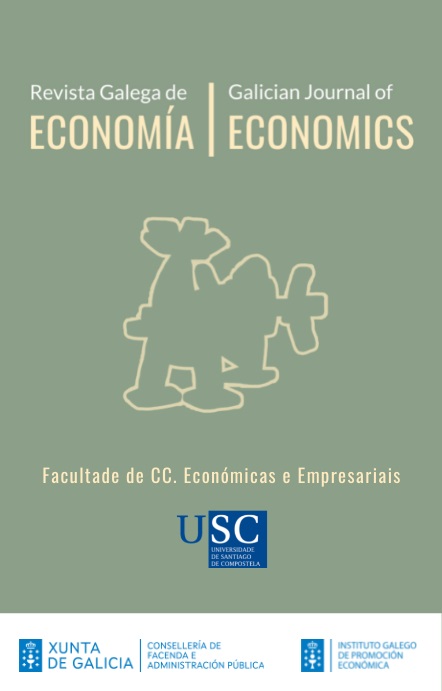Una evaluación de las políticas comerciales relacionadas con la COVID-19
Contenido principal del artículo
Resumen
En medio de la crisis de la COVID-19, el comercio internacional fue especialmente importante para garantizar el suministro de bienes médicos y de otro tipo. Este artículo analiza las políticas comerciales, relacionadas con la COVID-19, del sistema de notificaciones de la Organización Mundial del Comercio (OMC) durante el período comprendido entre febrero y octubre de 2020. Utilizamos la base de datos de notificaciones sobre la COVID-19 de los países miembros de la OMC, que incluye información sobre 198 notificaciones. Estos datos nos permiten observar la tendencia de las notificaciones, de los países y de los productos más afectados, de los tipos de medidas y de la adhesión a las directrices de la OMC. Nuestros resultados muestran dos olas de notificaciones. En la primera, los países actuaron unilateralmente, sin tener en cuenta las herramientas multilaterales. Sin embargo, en la segunda ola, caracterizada por el predominio de medidas facilitadoras del comercio, se observa una tendencia hacia acciones multilaterales a través del establecimiento de “declaraciones”. Los equipos de protección personal y los suministros médicos fueron los productos más afectados, seguidos de los productos agrícolas y de los alimenticios.
Palabras clave:
Detalles del artículo
Referencias
Arouna, A., Soullier, G., Méndez del Villar, P., & Demont, M. (2020). Policy options for mitigating impacts of COVID-19 on domestic rice value chains and food security in West Africa. Global Food Security, 26, 100405. DOI: https://doi.org/10.1016/j.gfs.2020.100405
Bown, C. P. (2020). COVID-19: Demand spikes, export restrictions, and quality concerns imperil poor country access to medical supplies. In R. E. Baldwin & S. J. Evenett (Eds.), COVID-19 and trade policy: Why turning inward won’t work (pp. 31-48). London, UK: CEPR Press. Retrieved from: https://voxeu.org/content/covid-19-and-trade-policy-why-turning-inward-won-t-work
Cardwell, R., & Ghazalian, P. L. (2020). COVID-19 and international food assistance: Policy proposals to keep food flowing. World Development, 135, 105059. DOI: https://doi.org/10.1016/j.worlddev.2020.105059
Evenett, S. J. (2020). Flawed prescription: Export curbs on medical goods won’t tackle shortages. In R. E. Baldwin & S. J. Evenett (Eds.), COVID-19 and trade policy: Why turning inward won’t work (pp. 49-62). London, UK: CEPR Press. Retrieved from: https://voxeu.org/content/covid-19-and-trade-policy-why-turning-inward-won-t-work
FAO. (2020). COVID-19 global economic recession: Avoiding hunger must be at the centre of the economic stimulus. In COVID-19 global economic recession: Avoiding hunger must be at the centre of the economic stimulus (Issue April). Rome, Italy: Food and Agriculture Organization of the United Nations. DOI: https://doi.org/10.4060/ca8800en
Fiorini, M., Hoekman, B., & Yildirim, A. (2020). COVID-19: Expanding access to essential supplies in a value chain world. In R. E. Baldwin & S. J. Evenett (Eds.), COVID-19 and trade policy: Why turning inward won’t work (pp. 63-76). London, UK: CEPR Press.
Retrieved from: https://voxeu.org/content/covid-19-and-trade-policy-why-turning-inward-won-t-work
Hossain, S. T. (2020). Impacts of COVID-19 on the agri-food sector: Food security policies of Asian productivity organization members. Journal of Agricultural Sciences - Sri Lanka, 15(2), 116-132. DOI: https://doi.org/10.4038/jas.v15i2.8794
Kwa, A., & Lunenborg, P. (2019). Notification and transparency issues in the WTO and the US’ November 2018 Communication. South Centre Research Paper No. 92. Geneva, Switzerland: South Centre. DOI: http://dx.doi.org/10.2139/ssrn.3559647
Lee, K., Worsnop, C. Z., Grépin, K. A., & Kamradt-Scott, A. (2020). Global coordination on cross-border travel and trade measures crucial to COVID-19 response. The Lancet, 395(10237), 1593-1595. DOI: https://doi.org/10.1016/S0140-6736(20)31032-1
Mahembe, E., & Odhiambo, N. M. (2017). On the link between foreign aid and poverty reduction in developing. Revista Galega de Economia, 26(2), 113-128. DOI: https://doi.org/10.15304/rge.26.2.4456
Martin, W. J., & Glauber, J. W. (2020). Trade policy and food security. In R. E. Baldwin & S. J. Evenett (Eds.), COVID-19 and trade policy: Why turning inward won’t work (pp. 89-102). London, UK: CEPR Press.
Retrieved from: https://voxeu.org/content/covid-19-and-trade-policy-why-turning-inward-won-t-work
Roe, D., Dickman, A., Kock, R., Milner-Gulland, E. J., Rihoy, E., & Sas-Rolfes, M.’t (2020). Beyond banning wildlife trade: COVID-19, conservation and development. World Development, 136, 105121. DOI: https://doi.org/10.1016/j.worlddev.2020.105121
Stellinger, A., Berglund, I., & Isakson, H. (2020). How trade can fight the pandemic and contribute to global health. In R. E. Baldwin & S. J. Evenett (Eds.), COVID-19 and trade policy: Why turning inward won’t work (pp. 21-30). London, UK: CEPR Press. Retrieved from: https://voxeu.org/content/covid-19-and-trade-policy-why-turning-inward-won-t-work
Udmale, P., Pal, I., Szabo, S., Pramanik, M., & Large, A. (2020). Global food security in the context of COVID-19: A scenario-based exploratory analysis. Progress in Disaster Science, 7, 100120. DOI: https://doi.org/10.1016/j.pdisas.2020.100120
UNCTAD. (2019). International classification of non-tariff measures 2019. In International classification of non-tariff measures 2019. Geneva, Switzerland: United Nations Conference on Trade and Development. DOI: https://doi.org/10.18356/33bf0bc6-en
UNCTAD. (2020). The Covid-19 shock to developing countries: Towards a “whatever it takes” programme for the two-thirds of the world’s population being left behind. UNCTAD/GDS/INF/2020/2. Geneva, Switzerland: United Nations Conference on Trade and Development. Retrieved from: https://unctad.org/system/files/official-document/gds_tdr2019_covid2_en.pdf
WHO. (2020). Weekly epidemiological update on COVID-19. October. Geneva, Switzerland: World Health Organization. Retrieved from: https://www.who.int/docs/default-source/coronaviruse/situation-reports/20201012-weekly-epi-update-9.pdf
World Bank. (2021). World development indicators. GNI per capita, Atlas method (current US$) [Data file]. Washington, DC: World Bank. Retrieved from: https://databank.worldbank.org/source/world-development-indicators
WTO. (1994). The general agreement on tariffs and trade (GATT 1947). Geneva, Switzerland: World Trade Organization. Retrieved from: https://www.wto.org/english/docs_e/legal_e/gatt47_01_e.htm#articleXI
WTO. (2000). WTO agreements series. Geneva, Switzerland: World Trade Organization. Retrieved from: https://www.wto.org/english/res_e/publications_e/wto_agree_series_e.htm
WTO. (2007). Members’ transparency toolkit. Geneva, Switzerland: World Trade Organization. Retrieved from: https://www.wto.org/english/tratop_e/sps_e/transparency_toolkit_e.htm
WTO. (2020a). Report to the TPRB from the director-general on trade-related developments. Geneva, Switzerland: World Trade Organization. Retrieved from: https://www.wto-ilibrary.org/trade-monitoring/report-to-the-tprb-from-the-director-general-on-trade-related-developments_252849b2-en
WTO. (2020b). DG Azevêdo video message: Trade forecast 2020. Geneva, Switzerland: World Trade Organization.
WTO. (2020c). Transparency – Why it matters at times of crisis. April, 1-5. Geneva, Switzerland: World Trade Organization. Retrieved from: https://www.wto.org/english/tratop_e/covid19_e/transparency_report_e.pdf
WTO. (2020d). WTO members’ notifications on COVID-19. Geneva, Switzerland: World Trade Organization. Retrieved from: https://www.wto.org/english/tratop_e/covid19_e/notifications_e.htm
WTO. (2020e). Trade in medical goods in the context of tackling COVID-19. Geneva, Switzerland: World Trade Organization. Retrieved from: https://www.wto.org/english/news_e/news20_e/rese_03apr20_e.pdf
WTO. (2020f). Agreement on agriculture. Geneva, Switzerland: World Trade Organization. Retrieved from: https://www.wto.org/english/docs_e/legal_e/14-ag_02_e.htm#articleXII







